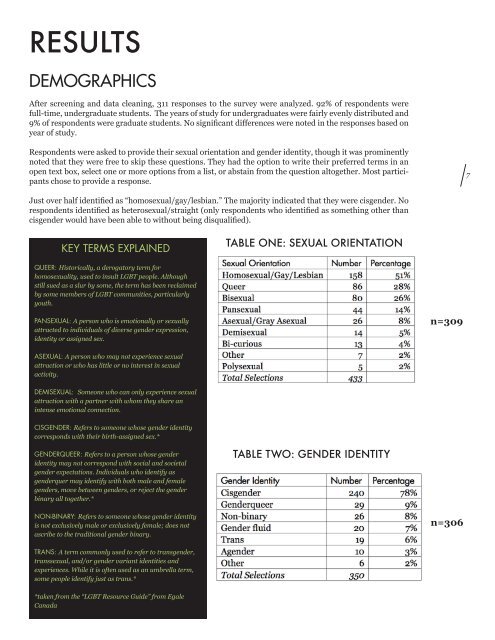LGBTQ+ STUDENT EXPERIENCE SURVEY REPORT
1MvuoIi
1MvuoIi
You also want an ePaper? Increase the reach of your titles
YUMPU automatically turns print PDFs into web optimized ePapers that Google loves.
RESULTS<br />
DEMOGRAPHICS<br />
After screening and data cleaning, 311 responses to the survey were analyzed. 92% of respondents were<br />
full-time, undergraduate students. The years of study for undergraduates were fairly evenly distributed and<br />
9% of respondents were graduate students. No significant differences were noted in the responses based on<br />
year of study.<br />
Respondents were asked to provide their sexual orientation and gender identity, though it was prominently<br />
noted that they were free to skip these questions. They had the option to write their preferred terms in an<br />
open text box, select one or more options from a list, or abstain from the question altogether. Most participants<br />
chose to provide a response.<br />
7<br />
Just over half identified as “homosexual/gay/lesbian.” The majority indicated that they were cisgender. No<br />
respondents identified as heterosexual/straight (only respondents who identified as something other than<br />
cisgender would have been able to without being disqualified).<br />
KEY TERMS EXPLAINED<br />
TABLE ONE: SEXUAL ORIENTATION<br />
QUEER: Historically, a derogatory term for<br />
homosexuality, used to insult LGBT people. Although<br />
still sued as a slur by some, the term has been reclaimed<br />
by some members of LGBT communities, particularly<br />
youth.<br />
PANSEXUAL: A person who is emotionally or sexually<br />
attracted to individuals of diverse gender expression,<br />
identity or assigned sex.<br />
n=309<br />
ASEXUAL: A person who may not experience sexual<br />
attraction or who has little or no interest in sexual<br />
activity.<br />
DEMISEXUAL: Someone who can only experience sexual<br />
attraction with a partner with whom they share an<br />
intense emotional connection.<br />
CISGENDER: Refers to someone whose gender identity<br />
corresponds with their birth-assigned sex.*<br />
GENDERQUEER: Refers to a person whose gender<br />
identity may not correspond with social and societal<br />
gender expectations. Individuals who identify as<br />
genderquer may identify with both male and female<br />
genders, move between genders, or reject the gender<br />
binary all together.*<br />
TABLE TWO: GENDER IDENTITY<br />
NON-BINARY: Refers to someone whose gender identity<br />
is not exclusively male or exclusively female; does not<br />
ascribe to the traditional gender binary.<br />
n=306<br />
TRANS: A term commonly used to refer to transgender,<br />
transsexual, and/or gender variant identities and<br />
experiences. While it is often used as an umbrella term,<br />
some people identify just as trans.*<br />
*taken from the “LGBT Resource Guide” from Egale<br />
Canada


